Pre-employment screening is key to finding the best candidates for your team. It helps filter out unqualified applicants, saving time and ensuring a better fit.
This blog post aims to compare Adaface and Evalart, helping recruiters choose the right assessment tool by highlighting their features and benefits.
Table of contents
How does Adaface work?
Adaface streamlines the hiring process by providing a robust online assessment platform. Recruiters can use Adaface to evaluate candidates using customized tests tailored to specific job descriptions.
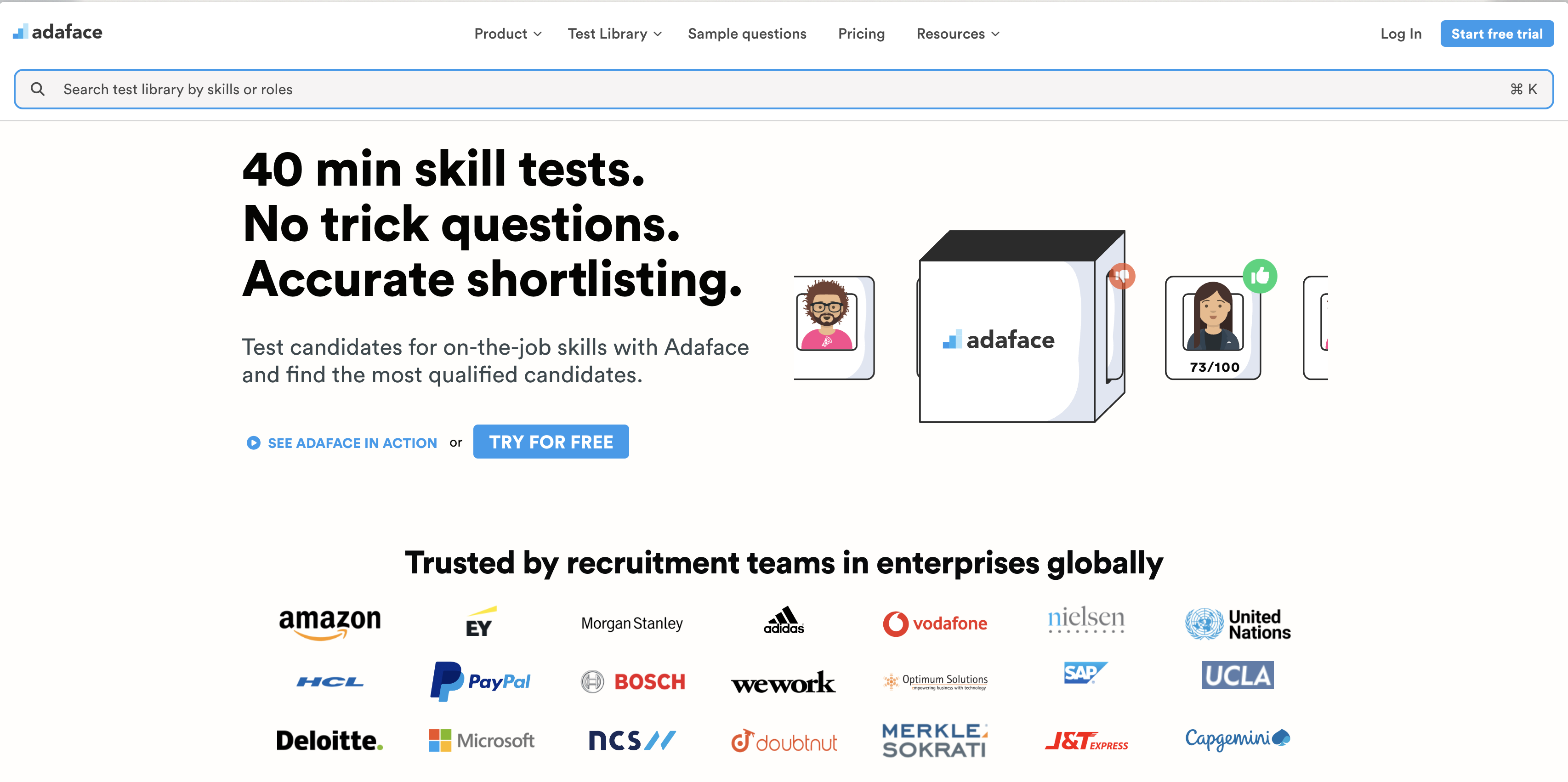
Recruiters love Adaface for its ability to create custom assessments based on job descriptions. This ensures that the evaluation criteria are perfectly aligned with the job requirements, providing more accurate and relevant insights.
Another reason recruiters opt for Adaface is the platform's scenario-based MCQs and coding questions. This combination efficiently evaluates a candidate's practical and theoretical knowledge, offering a well-rounded assessment.
Adaface stands out with its remote proctoring capabilities, ensuring accurate assessments. Features like browser monitoring, webcam proctoring, and location logging make it a reliable choice for maintaining test integrity. Learn more
How does Evalart work?
Evalart operates as an assessment platform designed to evaluate various skills in potential candidates. It offers a range of tests including programming, aptitude, and personality assessments to help recruiters screen applicants more thoroughly.
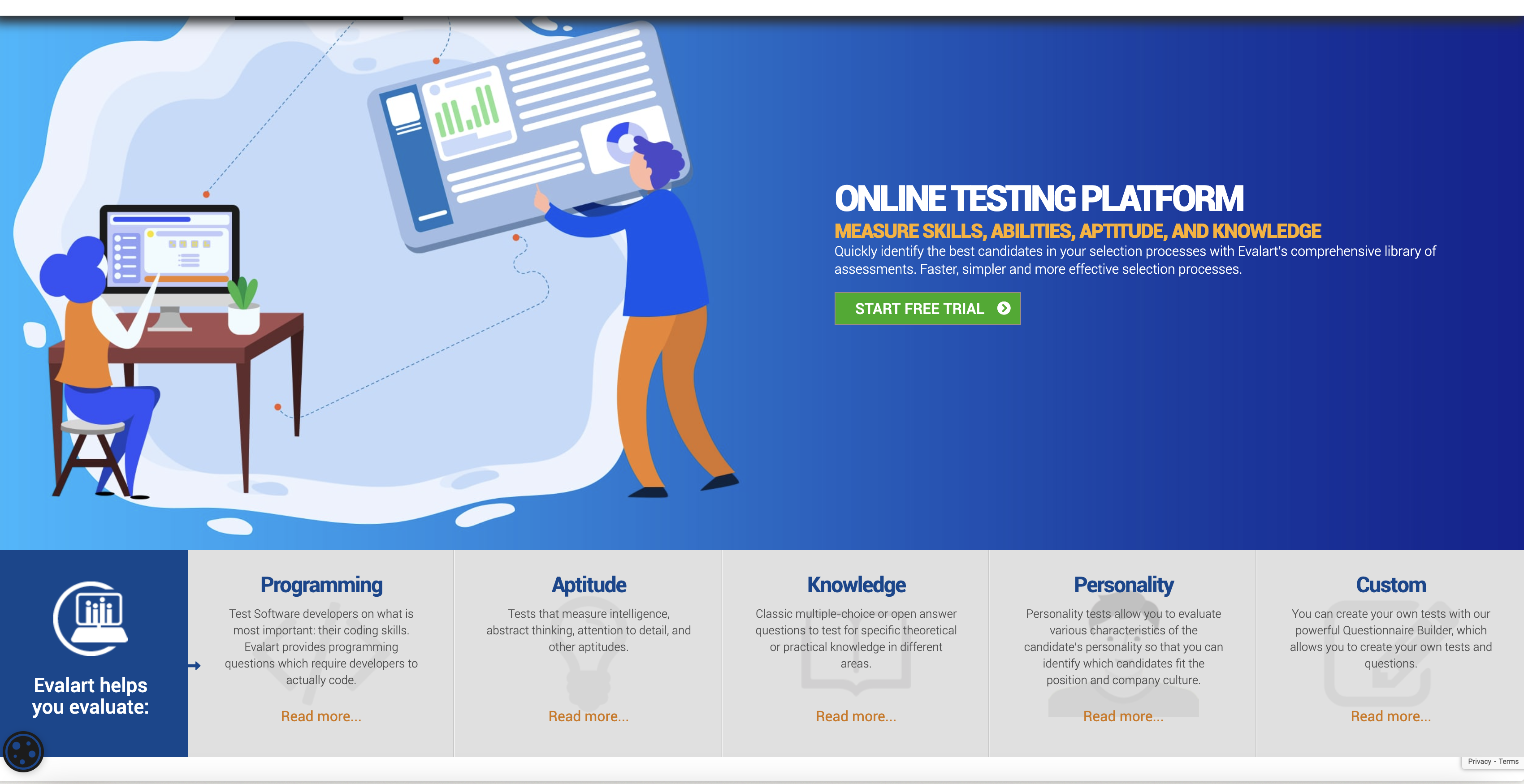
The platform includes coding questions for programming languages and SQL, and it allows recruiters to add their own questions. However, the assessments are primarily limited to ready-to-use tests and do not support custom tests based on job descriptions.
One standout feature of Evalart is its ability to facilitate the creation of custom coding questions. This allows recruiters to tailor assessments to suit specific roles and requirements, ensuring that the candidates are tested in relevant areas.
The platform could improve by incorporating situational judgment tests and job-specific scenario-based MCQs. Additionally, Evalart lacks support for certain business and IT cloud tests, potentially limiting its effectiveness in evaluating candidates for those roles.
Adaface vs Evalart: Test libraries
Both Adaface and Evalart offer a wide array of tests, spanning categories from coding and programming to personality and language skills. While both cover essential areas, Adaface steps up its game with tests for niche roles, custom questions, and job-specific scenarios.
Using these test libraries helps recruiters make informed hiring decisions by evaluating candidates before interviews. This approach cuts down on time-to-hire and ensures only the most suited candidates make it through.
Adaface's test library
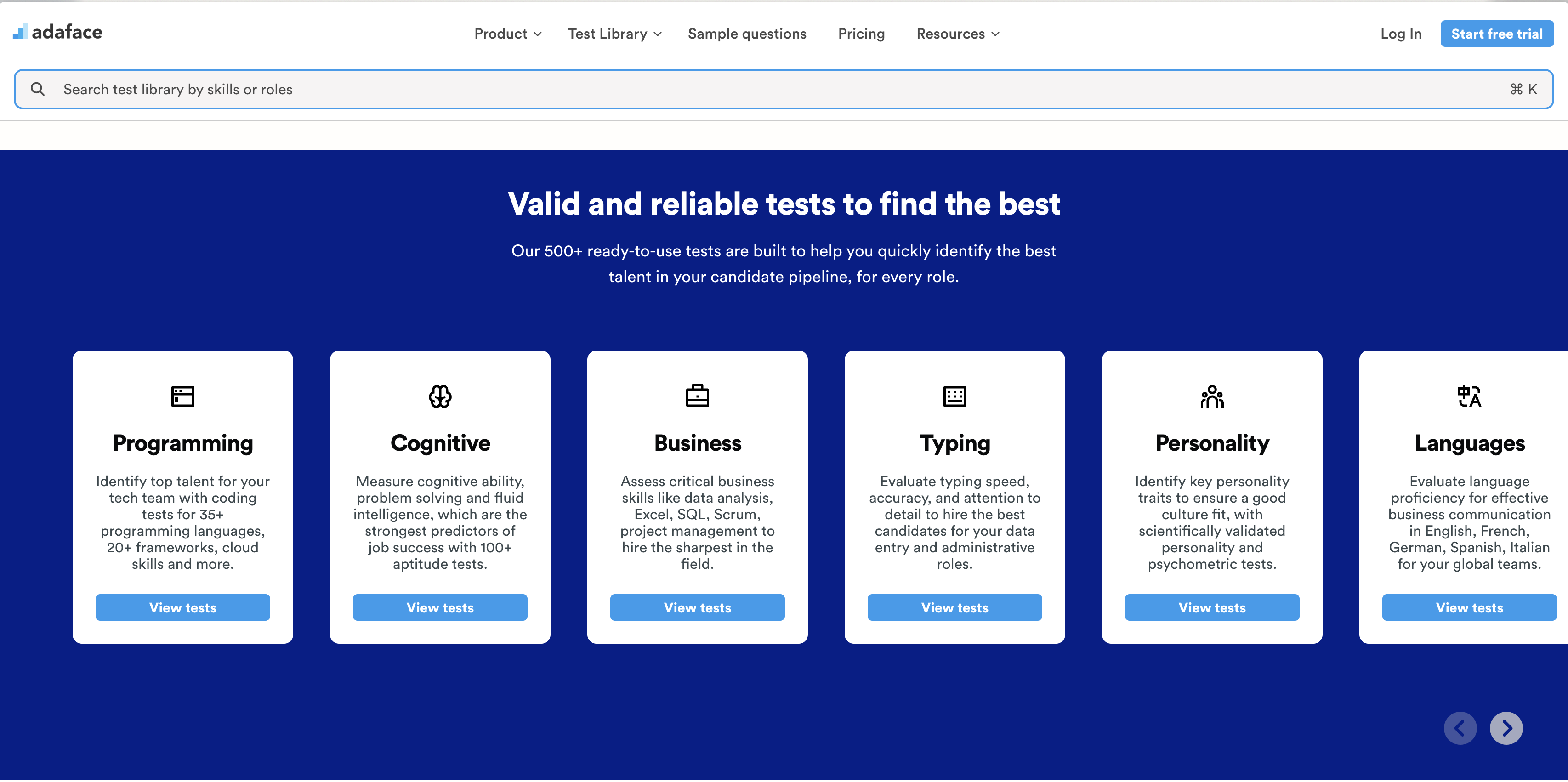
The Adaface test library is a treasure trove for recruiters. It features tests for:
- Programming and coding
- Situational judgment
- Aptitude (logical, numerical, verbal)
- Business skills
- Typing
- Personality
- Languages
- Finance
- AI
- IT and cloud roles
- Custom questions based on job descriptions
Recruiters flock to Adaface because it offers customized tests that fit specific job descriptions, ensuring higher relevance and accuracy in candidate assessments. The ability to add custom questions further refines the matching process.
In action, Adaface's test library complements the entire recruitment process, from sourcing to final interviews. To explore the extensive range, visit our collections for pre-employment assessments, IT tests, and role-specific tests.
Evalart's test library
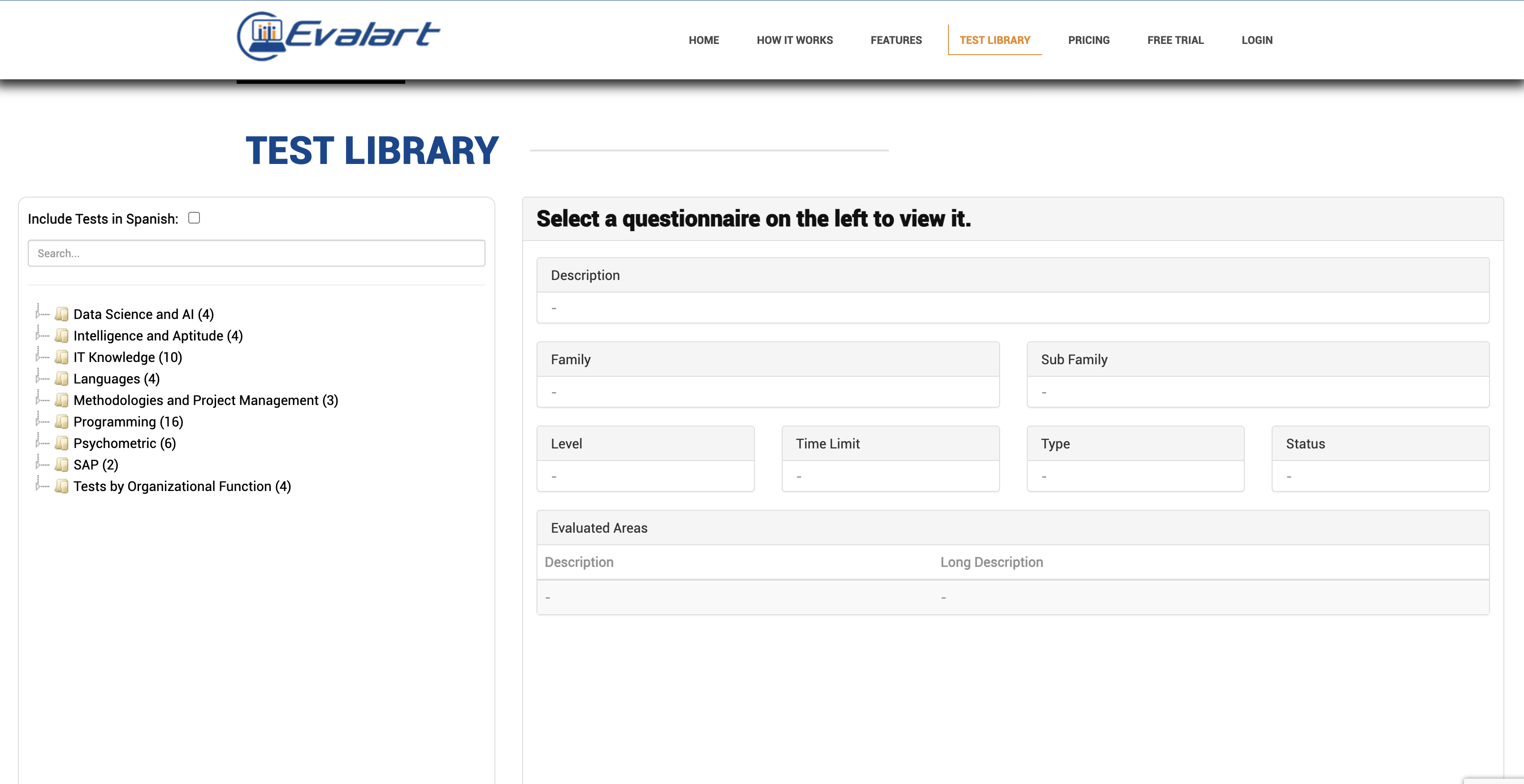
Evalart offers a library that primarily focuses on coding tests, but it only includes coding questions without any scenario-based multiple-choice questions, which narrows its scope.
This means that while you can assess a candidate's coding skills, you might miss out on evaluating their problem-solving abilities in real-world scenarios, leaving a gap in the assessment process.
Additionally, Evalart lacks variety in its test offerings; for example, you won't find business skills assessments or the ability to create customized tests tailored to specific job descriptions.
Comparison of test libraries
Adaface vs Evalart: Developer hiring
When hiring developers, recruiters need to assess a candidate’s full range of technical skills to see if they align with their team and workload.
Adaface and Evalart both offer a range of tests, including coding and algorithmic-thinking challenges. However, the scope and depth of these assessments vary significantly between the two platforms.
Hiring developers with Adaface
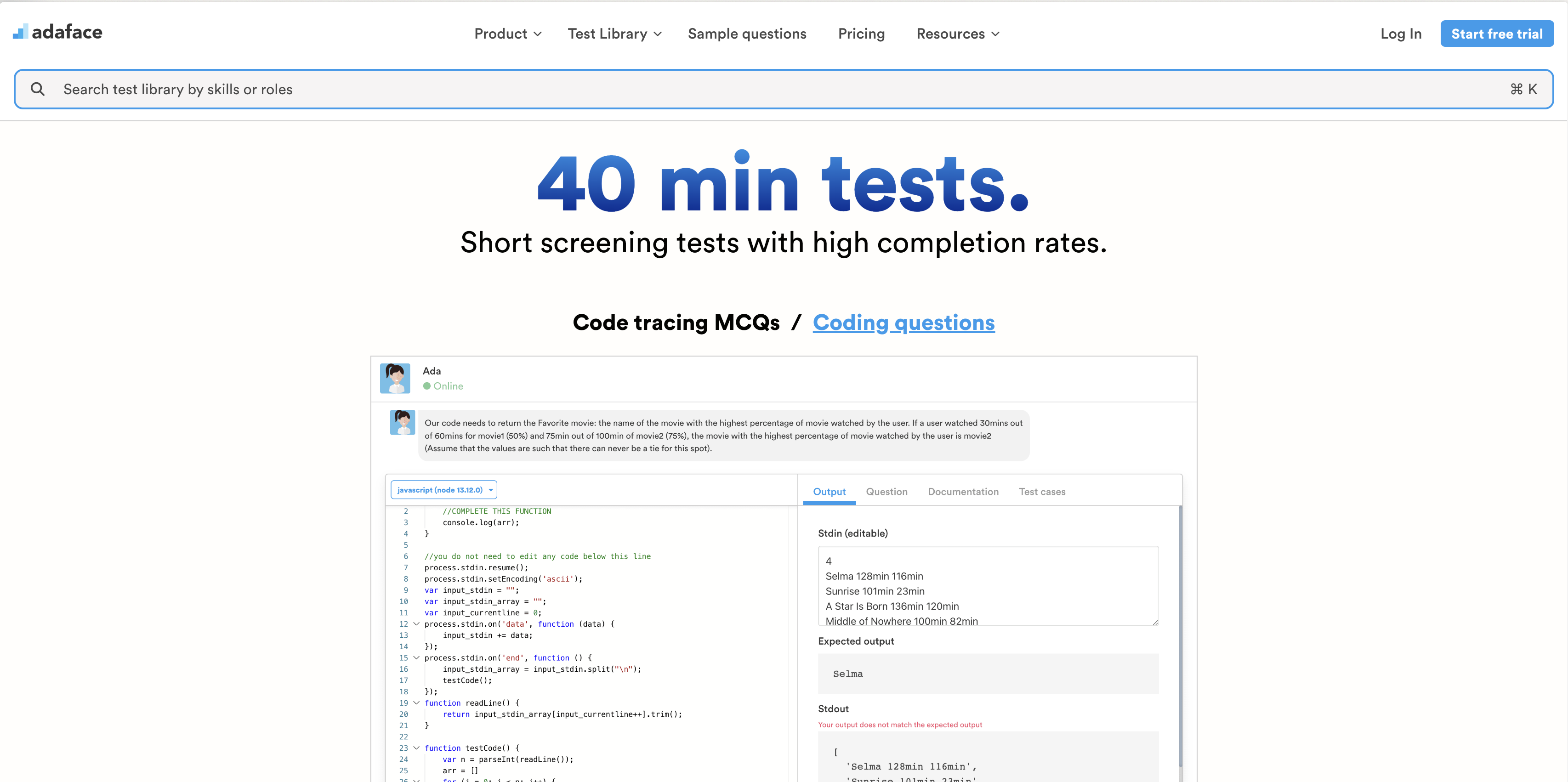
Adaface provides a wide array of functionalities for hiring developers, including coding questions in multiple programming languages, web and mobile framework questions, as well as data structures and algorithm questions. It also offers SQL and Excel workbook questions, code playback features, and supports custom coding questions.
Evalart, on the other hand, primarily focuses on coding questions but does not offer web or mobile framework questions. The platform lacks support for data structures, algorithm questions, and Excel workbook assessments, and it does not have a code playback feature.
Recruiters use Adaface to streamline their developer hiring process because it covers a broad spectrum of technical assessments. The platform supports custom coding questions and provides detailed analytics through features like code playback.
Adaface's extensive test library includes over 500+ skills such as Java and Python, ensuring that recruiters can tailor assessments to their specific needs.
Additionally, Adaface allows for the evaluation of soft skills through personality tests and cognitive abilities, giving a well-rounded view of the candidate's capabilities beyond just technical know-how.
Hiring developers with Evalart
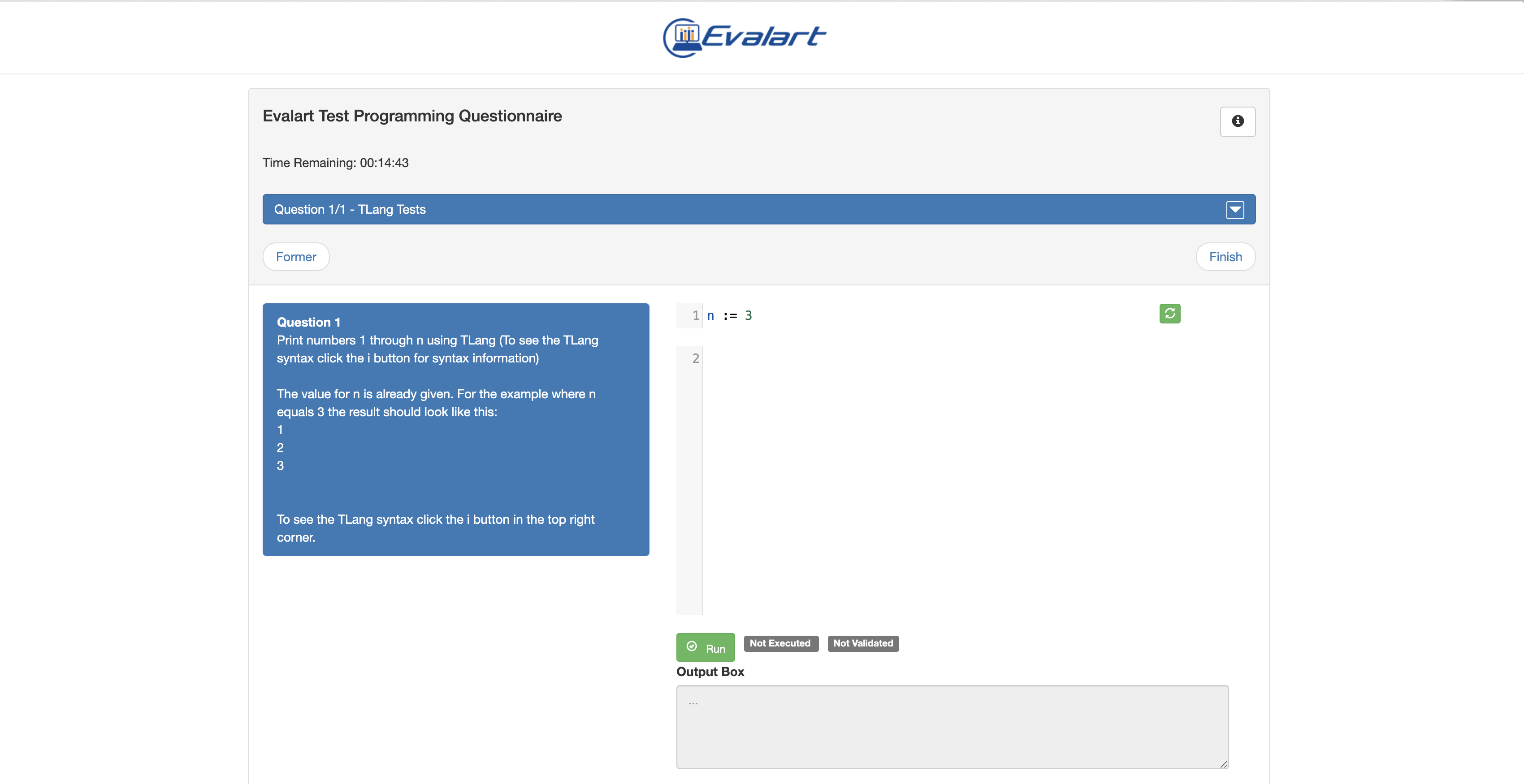
Evalart offers programming assessments focused on coding questions. Their test library allows for evaluating candidates primarily through direct coding challenges, which can help gauge hands-on technical skills.
The platform provides custom coding questions, allowing recruiters to tailor assessments to their specific needs. This feature is particularly useful for companies looking to evaluate candidates on unique requirements or technologies.
However, Evalart lacks support for web framework and mobile framework questions, which limits its ability to assess candidates’ knowledge in these crucial areas of development. Additionally, the absence of code playback functionality makes it challenging to evaluate a candidate's thought process during the test.
Comparison of developer hiring features
Adaface vs Evalart: Candidate experience and company branding
In the competitive world of talent acquisition, company branding plays a significant role. A strong brand not only attracts top talent but also builds trust and recognition among job seekers.
When it comes to company branding within recruitment platforms, elements like company logos, brand colors, and customizable communication templates can make a huge difference. These features help create a consistent and professional image that aligns with the company’s overall message.
Candidate experience and company branding with Adaface
Adaface shines in the realm of company branding with several standout features. One key feature is the ability to incorporate your company logo throughout the assessment process. This not only reinforces brand identity but also enhances the candidate experience by providing a familiar visual environment.
Another notable feature is the use of company brand colors within the platform. By aligning the assessment interface with your brand’s visual identity, Adaface ensures a seamless and cohesive representation of your company. This can help candidates feel more connected and engaged.
Lastly, Adaface offers customizable templates for invitations, shortlisting, and rejection emails. This allows recruiters to maintain consistent messaging and tone, further strengthening the company’s brand impression. For more on creating effective recruitment communications, check out our guide.
Candidate experience and company branding with Evalart
Evalart currently lacks the ability to enhance company branding directly on its platform. Users can't add their logos or brand colors to assessments, which could help create a more personalized experience for candidates and make the process feel less generic.
In the world of recruitment, a strong company brand can be a game changer. By customizing communication templates and assessments, organizations can ensure candidates feel a deeper connection to their brand and values, making the hiring process more engaging and effective.
However, without options for customizable invitation and rejection templates, Evalart might miss out on an opportunity to strengthen the candidate experience. A one-size-fits-all approach doesn't always resonate, and personal touches can make all the difference.
Adaface vs Evalart: Anti-cheating features
When it comes to online assessments, maintaining the integrity of the test is paramount. Recruiters need tools that can ensure candidates are evaluated fairly and honestly. An ideal proctoring solution combines multiple security features to prevent cheating and provide accurate results.
Anti-cheating features of Adaface
Adaface employs a host of advanced anti-cheating measures to deliver accurate and fair assessments. These features include:
- Web proctoring that logs browser activity to detect if candidates switch tabs.
- Webcam proctoring to ensure the candidate is always present and not receiving external help.
- Location logging and IP proctoring to track where the test is being taken from.
- Device fingerprinting to identify if the same device is used by multiple candidates.
- Copy-paste protection and full-screen proctoring to prevent unauthorized actions during the test.
One standout feature is Adaface’s ability to track browser activity through web proctoring. This ensures the candidate remains within the test environment and doesn't navigate away to search for answers. Additionally, Adaface uses webcam proctoring, which continuously monitors the candidate’s presence, adding another layer of security.
Furthermore, Adaface employs location logging and IP proctoring to confirm the consistency of test locations. These features help recruiters identify if multiple candidates are attempting to game the system by sharing test details. Learn more about these features in our complete guide on online remote proctoring.
Anti-cheating features of Evalart
Evalart offers several proctoring features, including webcam monitoring and user authentication, ensuring that test-takers are who they say they are. However, details about additional measures like IP tracking and full-screen monitoring remain murky.
One of the selling points for Evalart is its webcam proctoring, which can help recruiters verify that candidates are indeed present during assessments. This feature could be beneficial in preventing collusion or outside assistance during tests—an attractive proposition for many recruiters.
However, without features like IP address logging or device fingerprinting, Evalart's proctoring capabilities may leave room for candidates to exploit opportunities for cheating. The absence of such measures could indicate a gap in the overall integrity of the testing process.
Comparison of anti-cheating features
Adaface vs Evalart: Pricing and free trial
When it comes to assessment providers, pricing can vary based on features, credits, and company size. Recruiters should expect a mix of subscription models and pay-as-you-go options, making it vital to find a plan that aligns with their hiring needs.
Adaface pricing
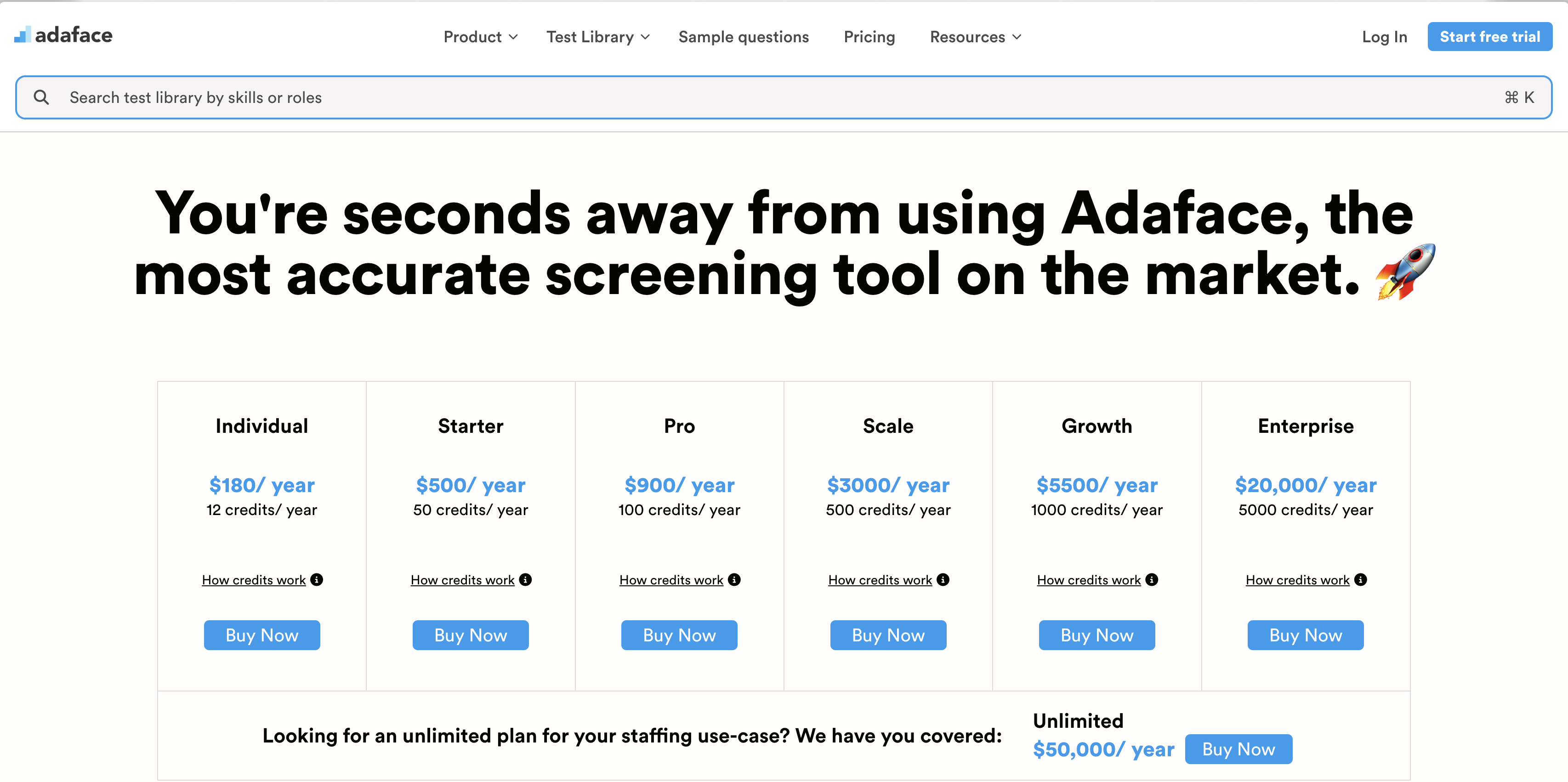
At Adaface, we offer transparent pricing with no hidden costs. Our plans cater to different usage levels, starting with the Starter plan at $500 for 50 credits, progressing to our Scale plan for $3000 for 500 credits, and up to our Growth plan at $5500 for 1000 credits.
Additionally, for larger organizations, we have the Enterprise plan priced at $20,000 for 400 credits and a unique Unlimited plan for $50,000 per year, allowing for endless candidate assessments. Check out our detailed pricing structure for more information on how we can support your hiring efforts! Adaface Pricing
When choosing a pricing plan, companies should consider not just the number of assessments required, but also the flexibility of the options available. Whether you're a startup or a large enterprise, our scalable plans make it easy to adapt to your hiring volume, ensuring you get the right talent without breaking the bank.
Evalart pricing
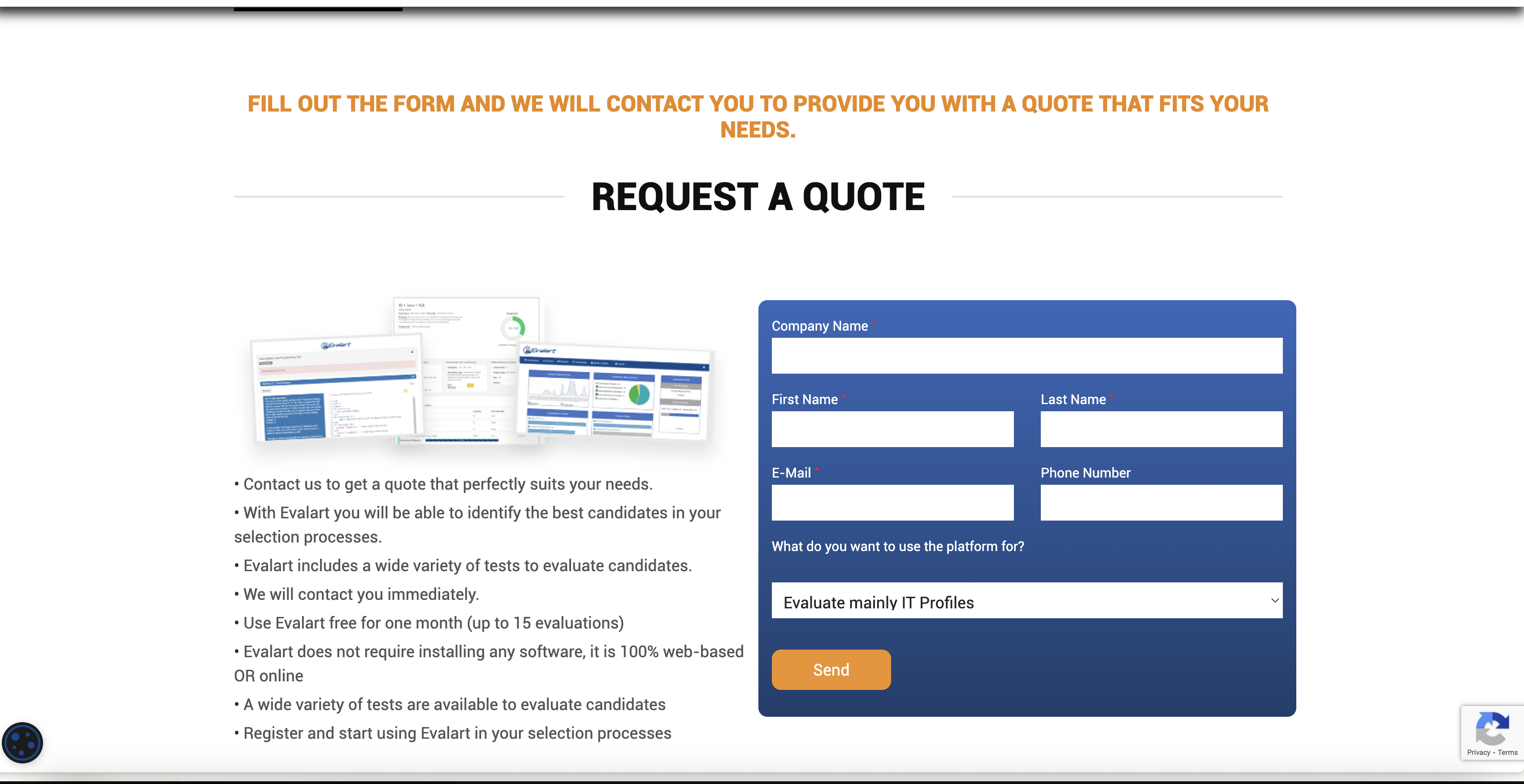
Evalart offers a pricing structure that’s not quite as transparent as some would like. Here’s what we know: - Individual Plan: Pricing starts at $180. - Starter Plan: Costs $500 for 50 credits. - Scale Plan: Available for $3,000, providing 500 credits. - Growth Plan: Set at $5,500 for 1,000 credits. - Enterprise Plan: Tailored at $20,000 for 400 credits. However, all these details require a sales call to confirm, which can feel like a game of hide and seek for recruiters.
While Evalart does offer a free one-month trial, the uncertainty in pricing can be a hurdle. Recruiters often prefer clear, upfront costs without needing to hop on a sales call. Plus, the absence of an unlimited plan limits scalability for growing teams. It would be nice if they allowed users to explore all features seamlessly, helping recruiters find their perfect fit without the back-and-forth.
Comparison of pricing
Adaface vs Evalart: Enterprise and startup friendliness
When evaluating Adaface and Evalart, enterprise and startup friendliness boils down to how well a platform can adapt to various hiring scales and processes. An ideal product should integrate seamlessly with existing HR tools, ensure data security, and offer flexibility for growth.
Adaface's enterprise and startup friendliness
Adaface shines with unlimited team seats across all plans, a game-changer for scaling startups and large enterprises alike. This eliminates the burden of extra costs as your team grows, allowing you to focus on hiring top talent instead.
Another standout feature is Adaface's custom API, enabling easy integration with ATS systems and other HR technologies. This flexibility is a must for enterprises looking to streamline their recruitment process without compromising on functionality or workflow.
For startups, the multiple invite options and bulk actions allow recruiters to manage candidates effectively, whether they are hiring a handful of new team members or thousands during a mass hiring event. These features ensure a smooth candidate experience and help maintain engagement throughout the process.
Evalart's enterprise and startup friendliness
Evalart offers some enterprise-friendly features like multiple invite options, allowing recruiters to send invitations via different channels. This can be particularly useful for both small and large-scale hiring events.
For startups, Evalart's ability to send multiple invites can speed up the initial stages of the recruitment process. Enterprises might find this helpful for mass hiring events, simplifying the way candidates are brought into the funnel.
However, Evalart lacks features like custom API access and priority support, which can be limiting for scaling businesses. Additionally, the absence of bulk actions and multiple question sets might pose challenges for companies aiming for large-scale, efficient recruitments.
Comparison of enterprise and startup friendliness
Adaface vs Evalart: Assessment quality control
When it comes to assessments, quality control is all about ensuring that tests are accurate, relevant, and truly reflect a candidate's skills. For recruiters, this means having confidence in the results they receive, helping them make informed hiring decisions.
Adaface's quality control features
Adaface emphasizes quality control through rigorous checks before any question goes live. Every question is evaluated to ensure it effectively assesses the necessary skills without being overly simplistic or misleading.
Additionally, feedback from candidates is actively sought and utilized to enhance the testing experience. This continuous loop of improvement helps ensure that tests remain relevant and challenging.
Adaface also employs social listening strategies to monitor if questions are being leaked online. This proactive approach helps maintain the integrity of the assessments, ensuring that questions remain non-googleable and truly test candidates' abilities. For more insights, explore how we design questions at Adaface.
Evalart's quality control features
Evalart has a quality control process that includes some form of oversight on its test questions, but the specifics are quite vague. There's no clear information on how candidate or customer feedback is integrated to enhance the quality of their assessments.
While Evalart does allow for some customization in tests, they lack transparency on how often questions are reviewed or updated. This can lead to situations where certain questions become outdated or overexposed without any replacement strategy.
Moreover, Evalart seems to miss out on proactive measures like social listening and proprietary algorithms to identify and address question quality. This could mean that candidates might encounter questions that have lost their relevance or are easily searchable online, impacting the integrity of assessments.
Comparison of quality control
Adaface vs Evalart: Customer support
Adaface vs Evalart: Customer support is a key factor for recruiters as it ensures smooth navigation through assessment tools and helps resolve issues swiftly, making the hiring process less stressful.
Adaface's customer support features
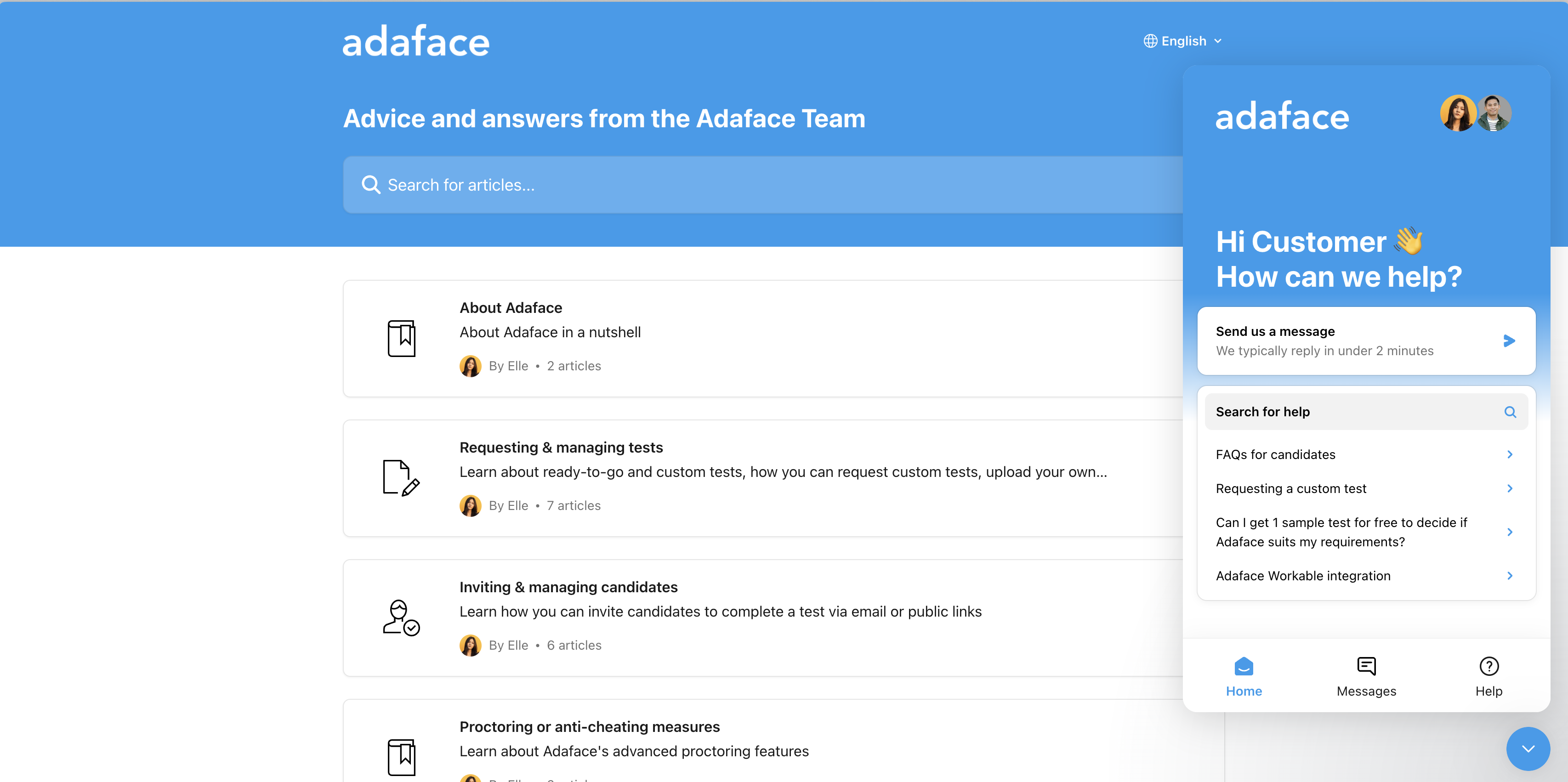
Adaface offers stellar customer support features including live chat and email assistance, ensuring that recruiters can quickly get help when they need it most. Plus, there's a dedicated help center filled with how-to guides and FAQs for those who prefer to explore on their own.
For those on higher plans, Adaface provides dedicated priority support, giving enterprises a specific point of contact for any inquiries. This ensures that big teams have a streamlined way to resolve issues and get back to hiring faster.
Additionally, onboarding training is available to help recruiters get up to speed with the platform's features. Curious about how to tailor your assessments? Check out our how to hire guides for tips on using Adaface effectively!
Evalart's customer support features
Evalart offers email support, live chat, and a help center filled with troubleshooting articles and FAQs, allowing users to find answers at their fingertips. However, their customer support lacks dedicated priority support and training options, which can leave some recruiters feeling a bit adrift.
While Evalart provides basic support avenues, they miss out on personalized assistance and onboarding that can really help users hit the ground running. The absence of phone support may also leave those who prefer a more direct line feeling a bit stranded.
Comparison of customer support
Adaface vs Evalart: Final verdict
Adaface and Evalart offer various similar features like programming tests, personality tests, and language tests. Both platforms help reduce bias by focusing on candidates' abilities.
Even with these similarities, Adaface stands out by offering scenario-based MCQs along with coding questions, making assessments more balanced and insightful.
Evalart lacks certain features such as situational judgment tests and business skill assessments, which can be important for comprehensive candidate evaluation.
Streamline hiring with skill tests
Adaface fills these gaps by providing a wide range of tests, from business skills to situational judgment tests, ensuring a more complete assessment experience.
Pre-employment assessments streamline the hiring process, offering tests that cover technical skills, cognitive abilities, and personality traits.
Using these tools, recruiters can achieve more accurate candidate evaluations, leading to better hiring decisions and a stronger team.
For a more effective hiring process, Adaface offers a comprehensive solution. Try a free trial or explore our assessment tools to see the difference.
Adaface vs Evalart FAQs
Adaface provides coding questions, scenario-based MCQs, aptitude tests, business tests, and many more.
No, Evalart does not offer situational judgment tests, whereas Adaface does.
Yes, both Adaface and Evalart allow you to add custom questions, but Adaface also designs questions specifically for customer use cases.
Yes, both Adaface and Evalart offer ready-to-use tests for quick deployment.
Adaface offers extensive proctoring features like webcam and IP proctoring, while Evalart offers webcam proctoring.
Adaface offers email support, live chat, a help center, and dedicated priority support for enterprise plans.

40 min skill tests.
No trick questions.
Accurate shortlisting.
We make it easy for you to find the best candidates in your pipeline with a 40 min skills test.
Try for freeRelated posts



